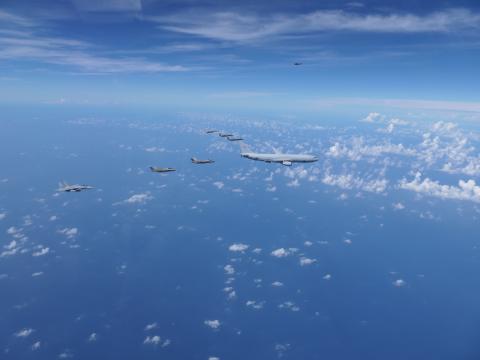U.S. Coast Guard To Adopt Drones for Law Enforcement
The U.S. Coast Guard tests unmanned vehicles for counter trafficking operations as it adapts to new technology challenges.
“Data and new tools are providing us an unprecedented increase in actual maritime domain awareness that enable information-driven operations,” said Vice Adm. Peter Gaultier, deputy commandant for operations at the U.S. Coast Guard.
Given the speed of innovation and the lengthy purchasing processes, the admiral explained the service engages business partners to deliver platforms that can be easily updated.
“This really includes the private sector, to help us develop advanced capabilities that we don't even know that we need but that are possible,” Adm. Gaultier told the audience during a keynote address at the WEST 2024 conference on Wednesday.
Cocaine and human trafficking follow sea routes north of South America and through Cuban waters toward the U.S. coasts, he explained.
The capability to employ unmanned and other surveillance platforms, including space assets, has increased interdictions, according to Adm. Gaultier. The Department of Defense currently supplies intelligence as the service develops its new capabilities.
“As we learn what works and doesn't we're going to be doing something different next year,” he said.
Data and new tools are providing us an unprecedented increase in actual maritime domain awareness.
As other services, like the Navy, employ drones for increasing capabilities and numbers, the types of platforms the Coast Guard requires are different, heavy on surveillance and light on offensive weapons, as it is the service’s mission to enforce the law—and humans cannot be replaced in that task yet.
Novel concepts place further pressures on the workforce to operate increasingly sophisticated systems.
“We're enhancing workforce flexibility to meet the expectations of a younger generation of talent by doing things like a lateral entry program for those joining the Coast Guard with skills and credentials,” Adm. Gaultier explained.
While the force adds skills one thing is not expected to change: “None of this happens without a world class workforce that is technically adept, service minded and hungry for purpose and challenge,” he said.
AFCEA cohosts WEST 2024 with the U.S. Naval Institute. The yearly event will continue until February 15. You can join the conversation on this event on X, formerly Twitter, using the hashtag #WEST2024.




Comments